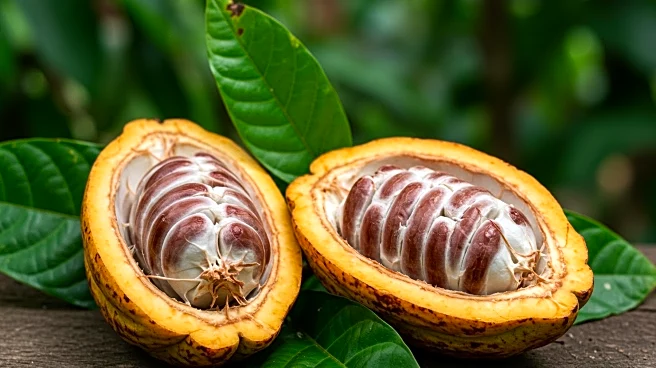What is the story about?
What's Happening?
Researchers from the University of Nottingham have discovered that the flavor of chocolate is significantly influenced by the microbes involved in the fermentation process of cocoa beans, rather than the genetic makeup of the cocoa itself. This breakthrough was achieved by isolating and analyzing the microbes present during fermentation, which traditionally occurs in the field over five to seven days. The study, published in Nature Microbiology, involved field research in Colombia and laboratory replication of the fermentation process. The findings suggest that controlling the microbial composition can lead to a consistent and unique flavor profile for chocolate, a development that could revolutionize the chocolate industry.
Why It's Important?
This discovery holds substantial implications for the chocolate industry, which currently lacks control over the fermentation process that determines flavor. By understanding and manipulating the microbial composition, chocolate manufacturers could produce chocolates with consistent and distinctive flavors, potentially setting new industry standards. This could lead to increased product differentiation and brand identity, offering companies a competitive edge. Additionally, it may enhance consumer satisfaction by providing a reliable taste experience. The ability to control flavor profiles could also reduce waste and improve efficiency in chocolate production, benefiting both producers and consumers.
What's Next?
The next steps involve exploring how this microbial control can be implemented on a commercial scale. While the research provides a proof of concept, the practical application in large-scale chocolate production remains to be developed. Companies may need to invest in new technologies or processes to harness this discovery. The industry might also see collaborations between scientists and chocolate manufacturers to refine and apply these findings. As the research gains attention, it could prompt further studies into microbial influences on other fermented foods, potentially broadening the impact of this discovery beyond chocolate.
Beyond the Headlines
The ability to control chocolate flavor through microbial management raises ethical and cultural questions about the authenticity and traditional methods of chocolate production. It challenges the notion of terroir, where the environment and traditional practices are believed to impart unique characteristics to food products. This scientific approach could lead to debates about the balance between innovation and tradition in food production. Additionally, it may influence consumer perceptions and preferences, as people become more aware of the scientific processes behind their favorite treats.















